
End of project and continuity
The project “Implementation of the model of welfare consultants in the municipality of Skudos district” is coming to an end. During this period, a total of 330 people applied for help to the welfare consultants of the Skudos district, and the indicator of the number of persons who received services provided for in the project was reached (270).
We invite those who did not have time to use the services of welfare consultants not to despair – after the end of the project, a clear continuation of the project is planned. It is planned to maintain the 0.75 full-time position of a welfare consultant for another 5 years after the end of the project implementation period. It is planned that welfare consultant services will be provided to 135 people per year in the Skudos district (675 people in 5 years).
We invite all persons facing emotional difficulties to continue registering for consultations.
We invite you to the publicity event!
April 4 at 1 p.m. In Skuodas, at the address Laisvės st. 69, the fourth publicizing event for the services of the Welfare consultant will take place.
We kindly invite you!
The event is free.


A success story
Most people who come to a wellness counselor face similar problems: a debilitating daily anxiety caused by the fear of making decisions and changing their lives and their own attitudes and behaviors. As an example, one could give a client who came to the consultation, who felt dissatisfaction with the relationship with the other party, said that he felt that the relationship had faded, that every conflict was becoming unbearable.
In addition, insomnia, lethargy and apathy at work contributed. The client said that he was considering divorce but was not committed to this decision, he kept doubting its correctness and felt constant anxiety due to his inability to make a decision. The advice and opinions of those around him weakened him even more, he dreamed of simply distancing himself from everything, running as fast as possible, packing his bags, running and not looking back.
During the consultation, the couple’s relationship was explored from various aspects – how much is rational, how much emotional thinking and how much it affects the couple’s behavior, why constant conflicts arise, how to properly resolve them. With the help of a well-being consultant, the client found out the reasons why he keeps falling into a vicious circle, where the errors in his thinking lie, how to control his emotions and how to prevent hasty decisions from causing more problems.
Daily routine, constant rush and chronic fatigue can have a great influence on our emotional state, which affects our thinking and behavior, reactions to various environmental stimuli, and can turn small interpersonal disputes into a serious test of relationships. It is important to try to find a balance between activity and rest and to take care of our emotional and physical health in order to live a full and happy life.
The mission of the welfare consultant in the regional press
On Friday, February 23, an article about the services of welfare consultants was published in the Skudos district newspaper “Mūsų žods”. The article presents the services of a welfare consultant and tells the success story of the consultations.


Psychological violence
Psychological abuse can take many forms, including emotional manipulation, humiliation, isolation, threats, constant criticism or spreading false information about a person. The main problem is that psychological abuse is often not as easily noticed as physical abuse, so it is often difficult for those around them to understand what is happening and react accordingly, and victims often feel insecure or depressed and do not know how or where to seek help.
It is important to understand that psychological violence can have serious consequences for those who experience it, such as reduced self-confidence, anxiety, problems with relationships with others, or even depression. Therefore, it is important not to delay and seek help if you experience psychological violence yourself or suspect that someone in your environment is experiencing it.
Consulting success story
We invite you to get acquainted with the story of a man who successfully completed the counseling course, which shows that it is never too late to change your life, your thinking and overcome past mistakes.
Povilas worked as a respectable teacher, had a wife and children. Problems arose when he felt a lack of money, began to feel self-doubt, realized that he could not provide the best life for his family. This obsessive thought led Povilas to make wrong life decisions – trying to earn money by hanging out with the wrong people led him to prison.
This greatly changed Povilas’ further life, he lost contact with his family and children. The emotional state of health was getting worse, tormented by daily anxiety, loneliness caused by the loss of relations with family and unemployment. Addiction to alcohol also contributed to all this.

Povilas came to the consultation realizing that he was at the bottom and no longer knew how to beautify his life, but he was determined to change.
Cognitive behavioral therapy methods helped Povilas understand how important the power of thoughts is and how important it is to learn to control your emotions. During the consultations, using various cognitive behavioral therapy methods, the man learned to recognize and change dysfunctional thoughts, false beliefs, modify his behavior and reactions in various stressful situations. Povilas learned proper problem solving methods that help when facing challenges and physical and psychological methods to reduce tension and anxiety. Counseling helped to return to positive thinking, to accept every experience as an experience. Currently, the man is successfully trying to socialize, tries to restore relations with his family, started taking care of his health, gave up bad habits, plays sports and has a positive attitude and makes plans for the future.
We invite you to visit a well-being consultant if you feel that you too need help and are determined to make changes towards better emotional health.

The mission of the welfare consultant in the regional press
On January 5, the Skudos district newspaper “Mūsų žods” published an article “It’s never too late to change your life” presenting the services of a well-being consultant and inviting everyone who has faced emotional problems to use them.
We hope that the success story of consultations presented in the article will inspire many to change and work with their emotional health.
On December 12-13, R. Granauskas public library held additional seminars for the inclusion of the Applicant, partners and employees of cooperating institutions in the model.
The seminar covered the principles and possibilities of the welfare consultant service model, effective communication, behavior and response to problematic situations, raising motivation for oneself and others, methods of conflict resolution and stress (anxiety) management. Seminar participants not only listened to theoretical lectures but also actively participated in discussions and performed various practical tasks.
One such task was the search for a balance between important areas of life – the circle of life self-control test. We invite you to try it. In the circle of life, you see various areas of life that you have to honestly assess yourself in a ten-point system. You can draw such a circle on a piece of paper and mark the rating on the scale. This circle will help you understand which areas of your life need more time and which can be spent a little less.

Translation results Translation result Employees of the applicant, partners and cooperating institutions are invited to the seminars!


Benefits of inter-institutional cooperation
Projekto metu yra skatinamas tarpinstitucinis bendradarbiavimas, įstaigų dalyvavimas plečiant gerovės konsultantų paslaugas regione, o taip pat palengvinant gerovės konsultantų paslaugų gavėjų įsitraukimą į įstaigų vykdomas veiklas. The Skuodas Open Youth Center, the Skuodas District Municipal Physical Education and Sports Center, the Skuodas District Cultural Center, the Skuodas District Society for the Disabled, the Employment Service (Skuodas Division), the Skuodas Region contribute to the dissemination of information about the welfare consultant service in Skuodas
community, public health office of Klaipėda district municipality, Skuodas secondary school, Skuodas city council and Skuodas mental health and psychotherapy center.
After attending the seminars, the employees of cooperating institutions are introduced to the principles of the model’s operation, and have learned to recognize situations and problems when a person can benefit from the help of welfare consultants. Therefore, the employees of these institutions refer the person who needs help to a welfare consultant if necessary, and tell about these services and their benefits.
We invite you to the event!
On October 23, the third publicizing event for the services of the Welfare Consultant will take place at the Romualds Granauskas Public Library.
Anyone interested in learning more about the work of a Wellbeing Consultant and positive emotional health is welcome to have a good time. The event is free.


Do you feel constant anxiety? Dealing with stress? Has your daily peace been disturbed by shocking events? Or are you suffering from various fears and self-doubt?
We invite you to visit a welfare consultant. A welfare consultant is a specialist with appropriate education and special training who helps people cope with mild emotional difficulties, symptoms of anxiety, stress, and depression using cognitive behavioral therapy methods.
Cognitive behavioral therapy differs from other types of psychotherapy, primarily because this treatment method is scientifically based, and its effectiveness can be evaluated through clinical studies. The goal of cognitive behavioral therapy is to reduce psychological stress by changing the mindset and to change the person’s reaction and behavior during stressful situations.
Cognitive behavioral therapy is based on the assumption that emotions and behavior depend on ourselves, on our negative attitudes formed as a result of various negative experiences, upbringing or simply natural characteristics.
During the meeting, the welfare consultant helps the visited person to understand his problems, and to understand how they affect the client’s thinking, feelings and behavior and how they influence daily activities. Consultations take place in accordance with the assistance plan agreed upon during the first meeting and the goals set. The purpose of welfare consultations is to teach the patient to find appropriate ways of solving problems and to apply them not only to the current situation but also to the future.
The mission of the welfare consultant in the regional press
On Tuesday, September 5, the third article about the services of welfare consultants was published in the Skudos district newspaper “Mūsų žods”. We invite you to read here.
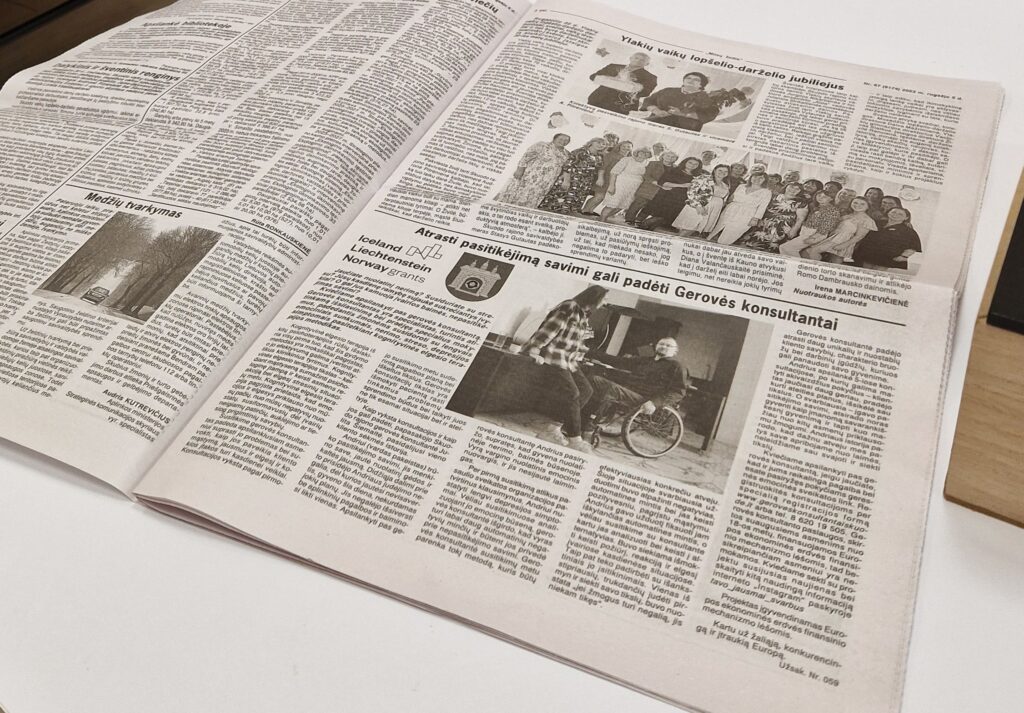

How to recognize depression?
There is no person who has not experienced emotional difficulties – regardless of age, social status, we all have various problems and make mistakes. In addition, psychological stress is caused by financial deprivation, negative, dependent or even violent people around. Negative emotions can affect your daily routine and quality of life. Sometimes one emotional difficulty is followed by another, or a significant shocking event occurs in life, then we can feel that we are losing control of our life and it becomes extremely important to seek help in time. Untreated prolonged emotional difficulties can eventually develop into depression.
Warning signs of possible depression can be divided into emotional, physical and behavioral:
Emotional: sadness, apathy, negative thoughts, irritability, anger, anxiety, despair, self-deprecation, guilt, suicidal thoughts.
Physical: constant fatigue, weight or appetite changes, insomnia, loss of sex drive, headaches.
Behavioral: self-harm, giving up previously enjoyed activities, inability to concentrate, avoiding communication, self-isolation.
If you are experiencing emotional difficulties, contact a well-being counselor.
Good Emotional Health Self-Assessment Test
• I feel the meaning of my life
• I am optimistic about the future
• I let go of past disappointments or hurts
• I have goals and consistently try to achieve them
• I don’t blame myself for failures, I accept mistakes as a lesson
• I wake up refreshed in the morning and am able to purposefully plan my day
• I am able to discover the good in myself and in others
• I think I have many positive qualities
• Manau kad turiu daug teigiamų savybių
• I know what helps me relax

Read the statements above and answer Yes or No.
If you answered “Yes” to all the statements, your emotional well-being is excellent.
If you disagree with one or two statements, think about why you answered that way and what you can change to feel better. Well-being consultants can help you get caught up in your feelings.
If you answered negatively to two or more statements, we invite you to contact a welfare consultant without delay before the situation becomes uncontrollable.

Signs of good emotional health
You are in good emotional health if:
You fall asleep easily, wake up rested;
Has a good appetite;
You are able to take care of your daily needs;
Your relationships with others are positive;
Be open to new experiences;
Self-confident;
Able to act independently;
You are able to learn from difficult situations;
Who has plans for the future, has dreams.
If it’s not about you, maybe it’s time to take care of your emotional health and see a wellness counselor?
In our country, as in the whole world, the number of emotional disorders – anxiety and depression – is increasing.
Lithuania still leads Europe in the number of suicides. Although emotional difficulties are experienced by a large part of society in Lithuania, mental health problems, and especially seeking help, are still stigmatized. However, it is encouraging that more and more people understand that asking for help is not a sign of weakness, but a sign of strength and a desire to help themselves, and are not afraid to speak about it out loud. It is very important to talk about your experiences and share your stories with other people. This can help reduce stigma and help other people know they are not alone.
Stigmatization can and should be reduced by educating the public that emotional difficulties are normal and can be treated.
If you are experiencing emotional difficulties, contact a well-being counselor.


The seminars for the inclusion of the employees of the municipal councils and community representatives in the model are coming to an end.
A total of 40 employees and community representatives will attend the seminars. During the seminars, attention is paid to identifying persons with psychological difficulties and problems, maintaining contact, motivating and encouraging them to seek help. The members of the community of each ward have a close relationship with other members, they know them, they can notice the changed behavior, emotions and psychological state of another person. Therefore, this activity will be aimed at the target group that should be the first to notice the need for a welfare consultant for a community member. In order for the services of welfare consultants to be not only accessible, but at the same time stigmatized as little as possible in society, the involvement of communities and their members in providing and recommending these services is important.
Breathing exercises help to regulate the activity of your system and calm down. Breath control can relax a tense body and slow down a stressed mind.
We invite you to try the diaphragmatic breathing exercise:
• Sit comfortably with your back straight or lie on your back.
• Place your hand on your stomach.
• Breathe in through your nose slowly and calmly, filling your belly with air. Imagine that you are drawing air not into your lungs but into your stomach, you should feel how the hand placed on your stomach rises up as you inhale, as if you were filling a balloon. Try not to inhale too strongly, do not raise your shoulders.
• Exhale slowly to the count of five. After exhaling, wait 2-3 seconds before inhaling again.
• Try to keep breathing slower.
• Continue this exercise for about 10 minutes
Breathing exercises are most effective when done regularly.


The second Welfare Consultant newspaper has already been published and will be distributed in various institutions in the Skuoda district.
(In the photo – R. Granauskas public library of Skuodas district municipality)
We invite you to take it, read it and share it with everyone who would be interested in the service of the Welfare Consultant.
We invite you to read online here
Consulting success story
Rasa lived in a toxic marriage for 14 years until, fed up with constant psychological, emotional and even physical violence, she decided to change her life and initiated a divorce. But this decisive step did not bring any changes because the former spouses continued to live under the same roof. The fear of change prevented the woman from taking the following steps, because she had nowhere to stay, stable financial income, and a safe close environment in order to move away from her violent ex-partner. Therefore, despite the divorce, she stayed with her children to live in the same house as her ex-spouse, in her own and another person’s suffering. Unable to bear the internal pain, feeling psychological tension every day, the woman started drinking. Pain and sadness, despair, helplessness increased, and depression became her constant companion.
Rasa lost hope that her life could change, until those around her, noticing her emotional and physical condition, persuaded her to pick herself up and start working on herself, because she could no longer continue like this.
The woman started visiting a well-being consultant and, with her help using cognitive behavioral therapy methods, worked with her fear of change, learned to manage emotions and negative thoughts. Active work with herself during and between consultations gave immeasurable benefits – she became a self-confident, stronger woman who can make decisions independently. Having learned to manage negative thoughts based on her emotions, fears, not to give in to preconceived beliefs, she made many great decisions towards her better future. Moved to another home where she feels safe and able to be herself. In the time of practitioners and classes, I understood how and when to set boundaries for a former toxic partner, since it is not possible to completely stop their communication because of common children. After many years of raising and caring for children, she got a job and became a financially independent and self-confident woman. Desires and goals have returned, now she is planning the kind of future she wants and has always dreamed of.

Most people dream of a different life than the one they have. Most of the time, these are not even hard-to-achieve dreams – changing jobs, moving to another apartment, city or country, starting your own business or ending a toxic relationship. After all, we probably all have people in our environment who managed to achieve changes in their lives, whom we admire, observe, maybe even envy their success. People who succeed in moving forward and achieving their goals were not born under a lucky star. They achieved this through determination, persistence, hard work, and self-belief. Only one thing stops us from a better life – the fear of change.
Most of the time, this is the only reason why a person stays where he was and does not pursue the life of his dreams, and the brakes we create ourselves – children, loved ones, financial opportunities, lack of the right moment – are just excuses to stay in the comfort zone. It’s strange, but a person reconciles with the current situation to the extent that that unloved life still remains a kind of comfort zone because the fear of the unknown, the negative thinking that it could be worse, takes over.
Cognitive behavioral therapy, the methods of which welfare consultants apply in consultations, is based on the assumption that our thoughts, emotions and behavior are closely related and affect each other, and a person’s well-being is determined by his own thinking, which shapes the corresponding behavior.
If you feel that you need help to control negative thoughts, you are determined to change, but you don’t know where to start – we invite you to register with a Wellness consultant

Seminars for the inclusion of the applicant, partners and employees of cooperating institutions in the model are already coming to an end.
The entire cycle of seminars will be completed by 3 groups of 10 people each – 1 group of social workers, and 2 group of employees of the applicant and partner organizations, as well as representatives of cooperating institutions.
During the seminars, the participants were introduced to the operating principles and possibilities of the welfare consultant service model, discussed what effective communication looks like, how problem situations should be managed, how to recognize them and respond appropriately, how to act during conflicts and resolve them. Emphasis is placed on raising motivation for yourself and those around you, and the importance of good emotional well-being. Seminar participants are not only introduced to theoretical information, but also take part in practical sessions, perform various stress management tasks, and learn various employment-promoting activities with adults and youth.
Acquainting the representatives of cooperating institutions with the activities of a welfare consultant is particularly important, the aim is that these persons, who deal with many people of different ages and social backgrounds on a daily basis, will be able to recognize those who have encountered emotional difficulties, provide information about the services of a welfare consultant and encourage them to apply.

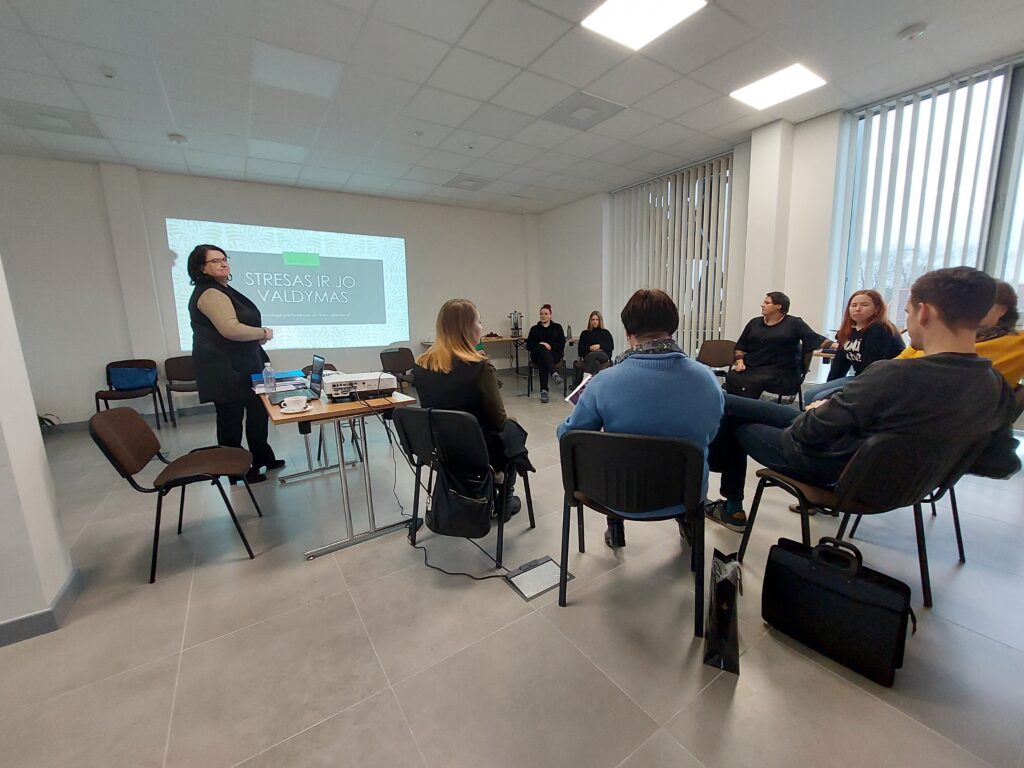
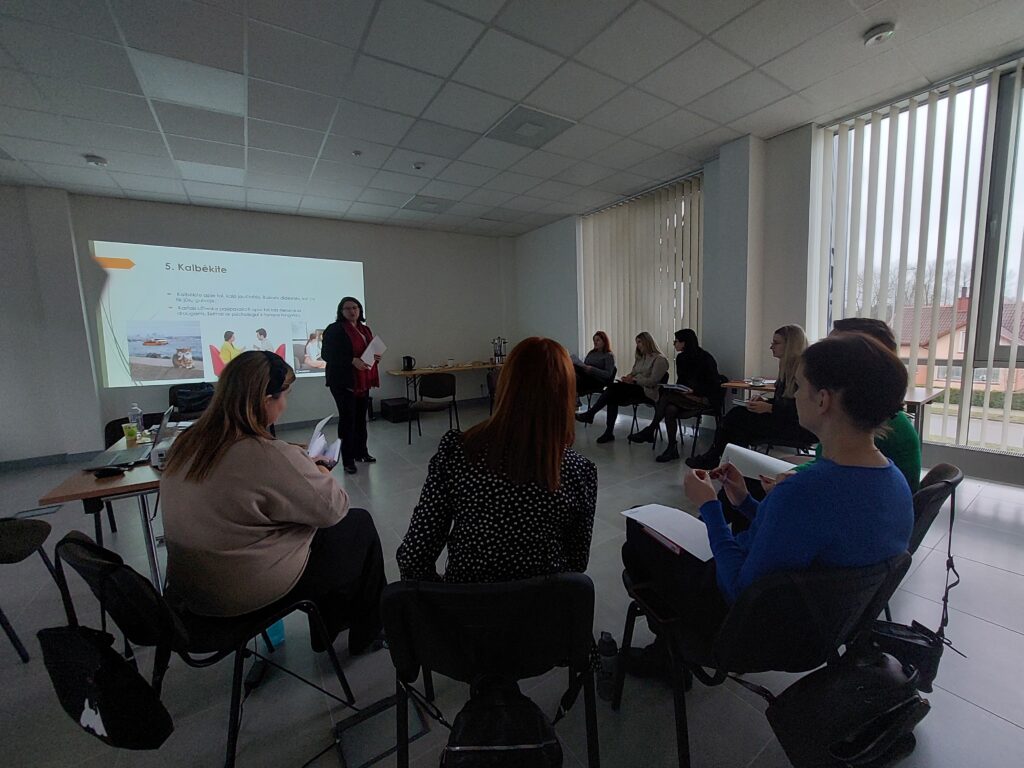

Talking to a friend or family member is very important – it is an honest sharing of your feelings with the closest person who knows, loves and supports you.
However, talking to a loved one is no substitute for talking to a specialist, and here are a few reasons why:
The welfare consultant adheres to objectivity, unconditionality towards the client and confidentiality. A welfare counselor assesses the current situation objectively, while friends will simply always be on your side. It’s always worth thinking about, can you be absolutely sure that your friends won’t reveal your secrets to anyone?
Talking to a wellbeing counselor allows the client to be themselves, not judged and accepted as they are. When talking to friends or relatives, even
trying to be open, sometimes we turn the situation around, fearing to be misunderstood, spoiling the opinion of ourselves, and also being careful not to say too much, in case the secret is accidentally revealed.
A well-being consultant helps you to know your feelings, to learn to manage your emotions. During the consultation, through the questions asked, the client is helped to understand himself and change his thoughts and behavior, look at the situation differently and deal more easily with difficulties, not only those that are bothering him now but also in the future. A friend listens and advises how to behave in a specific situation, guided by feelings, subjectively evaluating what he thinks is best, but not always correct.
Emotional intelligence is a person’s ability to name his feelings, manage emotions, the ability to communicate with others, empathy, the ability to recognize other people’s emotions and to be able to direct this information in the right direction.
A person with low emotional intelligence:
• He may appear calm and restrained until he gets into some unpleasant situation – then he is unable to control flooded negative emotions, reacts aggressively, may blame others for his failures.
• Can’t take even constructive criticism, but is critical of other people.
• Faces difficulties in expressing his thoughts, but constantly wants to argue, is inflexible.
• He does not admit his mistakes, does not learn from his mistakes and does not look for new ways to solve problems, tends to pessimism and loss of motivation.
• He does not have a sense of empathy, other people are not interested in him, he does not know how to listen, understand and sympathize, he does not notice when others need help.
• He experiences difficulties in maintaining friendly relations with other people, because he does not know how to accept others’ opinions, seek a compromise, empathize.

The good news is that emotional intelligence is a skill that can be developed.
A wellness counselor can help you learn to manage your emotions and respond appropriately to failures, criticism, and various life changes.
Worth knowing!
Stress is the body’s reaction to situations causing negative emotions, problems, unpleasant events. Stress negatively affects both mental (anxiety, fear, irritability, fatigue, anger) and physical health (increased sweating, headache, digestive problems, weakened immunity). It is very important to recognize stress and manage it in time before it becomes chronic.
What can you do to help yourself?
Prioritize. Sometimes the situation in our mind seems much worse than it really is. Try to write it down. Write down all the problems, all the possible solutions, all the steps in the paragraph. Start with small, easy things to do.
Go out for a walk. A walk in the fresh air, in nature, will allow you to relax and relieve the symptoms of stress.
Take time for yourself. A break from everyday problems is simply a necessary condition for stress management. Do something you like – read a book, do crafts, exercise, meet friends.
Get adequate rest. Nors vakarienė draugu rate ar vakaras su filmu skamba kaip puikus atsipalaidavimo būdas, vis dėl to svarbu nepamiršti svarbiausio – kokybiško miego.
Avoid things that cause negative emotions. Try to distance yourself from aggressive, critical, insensitive people. Set limits on how much time you spend per day reading the news. In your free time, choose books or movies that evoke positive emotions.
Don’t be afraid to ask for help. Talk to loved ones. Perhaps they will be able to help you solve the situations that have arisen or give you useful advice. Contact a Wellbeing Consultant for help.

In order to acquaint the employees of the applicant, partners and cooperating institutions with the principles and methods of welfare consultant services, to teach them to recognize situations and problems that can be solved by the help of welfare consultants, seminars on inclusion in the model are conducted. It is very important to be able to provide the acquired information to potential clients of the welfare consultant, and to motivate them to use the services.
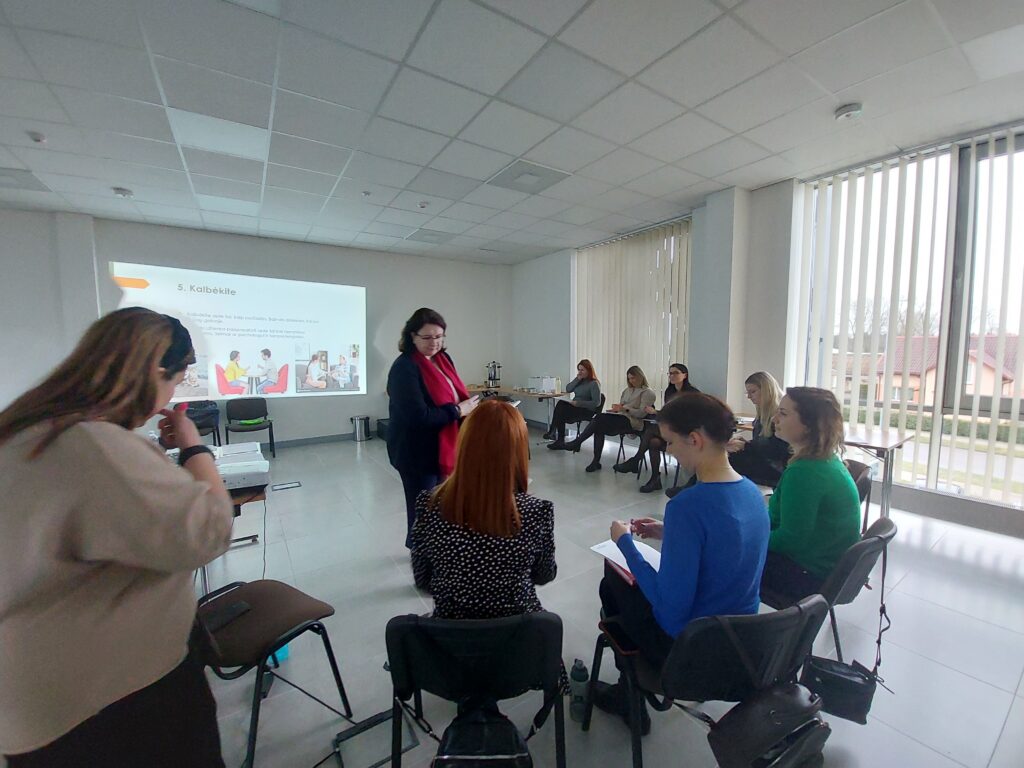
Wellbeing counselors provide low-intensity emotional counseling services based on cognitive behavioral therapy. Cognitive behavioral therapy is one of the most popular and effective types of therapy, its effectiveness has been proven by clinical studies.
Cognitive behavioral therapy is rapidly gaining popularity, as the modern pace of life and the growing needs of people encourage the search for a quick, goal-oriented way of solving problems. Cognitive behavioral therapy helps to know and understand how a person’s thoughts, emotions and behavior are connected, allows a person to find more suitable and better ways of solving problems than were used before. Cognitive behavioral therapy is based on evidence that our well-being does not depend on what happens to us, but on how we accept and react to it. People are used to thinking that certain events cause anger, sadness, joy, but different people, or even the same person, react differently to the same event at different times.
The goals of cognitive behavioral therapy: to allow you to get to know yourself better, to strengthen self-control, to recognize harmful thoughts and to change them, so that the person’s attitude, beliefs, attitudes do not hinder, but help to live, to form personal behavioral skills, to take such actions that will produce the desired and expected results.
During the therapy, the person applying is taught to live “here and now”, thanks to the acquired knowledge, he learns to solve his problems independently.

In order to create a systematic handout of the services provided by welfare consultants, which could be distributed in print and online forms, the welfare consultant newspaper was created. The printed form of the newspaper will be distributed through various district institutions, organizations, wards and communities.
We invite you to read the online version of the newspaper or download it in PDF format here
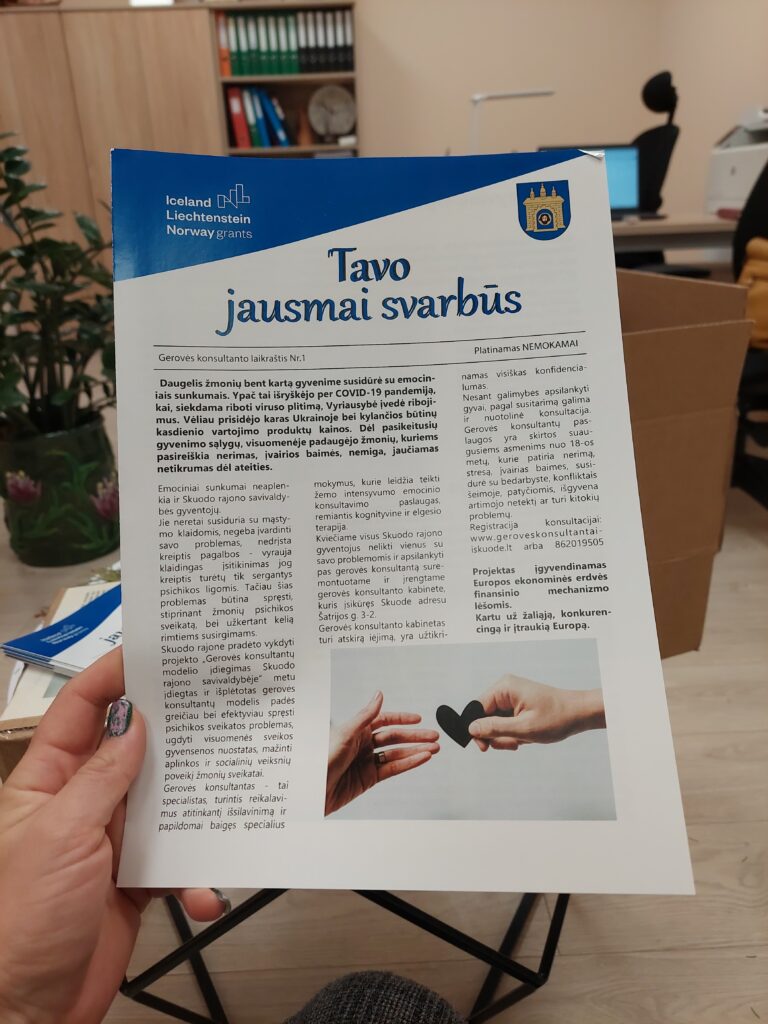


Welfare consultants Julita Šiemaitė and Ginta Kazlauskienė presented the services of a Welfare consultant to future graduates at the Mosėdis high school in the Skuoda district, and talked about how to prepare their psychological health before exams and settlements. Introduced methods of raising your self-esteem and discussed what self-confidence is.



On October 5, on the occasion of Teachers’ Day, Welfare consultant Julita Šiemaitė tried out the role of a teacher – she conducted a lesson for the students of Mosėdžių Gymnasium in Skuoda district. During the lesson, high school students had the opportunity to try the Cognitive Behavioral Therapy round, performed various psychological self-analysis tests.


The public opinion formation video clip “For others is worse” was created for the project “Implementation of the model of welfare consultants in the municipality of Skuodas district”. The video clip was created in order to increase the awareness of the welfare consultant’s services, to change public opinion about the need for human mental health treatment in the virtual space. It is important to understand that you should not compare yourself to others and think that personal problems are unimportant or not worth solving, because others have it worse. We encourage you to accept help and feel good regardless of how others feel.
We invite you to watch the video here
On September 27, an article about the services of welfare consultants was published in the Skuodas district newspaper “Mūsų žodis”. –

The residents of Skuodas district, dressed in opinion-forming merchandising, send a positive message about the service of welfare consultants in a good mood at the city festival.

The welfare consultant’s educational posters have already been printed and displayed on various institutions in the Skudos district.
The educational posters present the services of a welfare consultant and provide contacts of welfare consultants. Designs are created taking into account the age of the target groups (youth, adults and the elderly).


Wellbeing consultants have already completed 6 months of training and are ready to provide counseling.
Skuodas district welfare consultants Julita Siemaitė and Ginta Kazlauskienė invite all Skuodas district residents over the age of 18 to register for a consultation, who feel stress, worry, suffer from insomnia or depression, or have experienced a loss. During the meeting, welfare consultants will help you look at existing problems from a different perspective. We will look for the reason that causes unpleasant emotions and at the same time look for the best ways to change those emotions into pleasant ones.
Consultations are free.

In the welfare consultant’s office, there are two tables, two ergonomic specialist chairs, a lockable file cabinet, a closet for methodological tools, a wardrobe, a hanging mirror, chairs for guests, a coffee/coffee table, a rocking chair, a sofa and an armchair.
The office of the welfare consultant is equipped with office and organizational equipment – a laptop computer with software, a multifunction printing – copying machine, a telephone, a paper shredder machine.
In order to create suitable and modern working conditions, to facilitate communication between the Welfare consultant and the client, a coffee machine and a water dispenser were purchased.
It is possible to offer warm tea or coffee on a cold winter day or fresh water on a hot summer day.
On February 18, 2022, a contract was signed with UAB “Skobartas” regarding the renovation of the welfare consultant’s office.”
